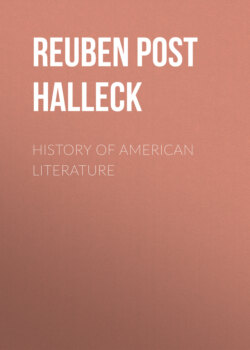Читать книгу History of American Literature - Reuben Post Halleck - Страница 26
На сайте Литреса книга снята с продажи.
QUESTIONS AND SUGGESTIONS
ОглавлениеIs Captain John Smith more remarkable for chronicling what passed before his senses or for explaining what he saw? How does his account of the Indians (p. 18 of this text) compare with modern accounts? Is he apparently a novice, or somewhat skilled in writing prose? Does he seem to you to be a romancer or a narrator of a plain unvarnished tale?
Compare Strachey's storm at sea with Act I. of Shakespeare's Tempest. In what part of this Act and under what circumstances does he mention "the still-vex'd Bermoothes"?
Compare the ability of the three great early colonizers, Smith, Bradford, and Winthrop, in writing narrative prose. Smith's story of Pocahontas is easily accessible. Those who can find the complete works of Bradford and Winthrop may select from Bradford for comparison his story of Squanto, the Pilgrims' tame Indian. Winthrop's Journal contains many specimens of brief narrative, such as the story of the voyage across the Atlantic from March 29 to June 14, 1630; of Winthrop's losing himself in the wood, October 11, 1631; of shipwreck on the Isle of Shoals, August 16, 1635; of an indentured servant, March 8, 1636; of an adventure with Indians, July 20–30, August 24, and October 8, 1636. Those without opportunity to consult the works of Bradford and Winthrop will find in the books of selections sufficient material for comparison.
Is brevity or prolixity a quality of these early narrators? What English prose written before 1640 is superior to the work of these three men? Why is it especially important for Americans to know something of their writings? What advance in prose narrative do you find in Beverly and Byrd?
What characteristic of a famous English prose writer of the nineteenth century is noticeable in Ward's essay on fashions?
Why could fine poetry not be reasonably expected in early Virginia and New
England? What are some of the Calvinistic tenets expounded in
Wigglesworth's Day of Doom? Choose the best two short selections of colonial poetry.
What are some of the qualifications of a good diarist? Which of these do you find in the Diary of Samuel Sewall?
Point out some of the fantastic prose expressions of Cotton Mather. Compare his narrative of Captain Phips with the work of Smith, Bradford, and Winthrop, on the one hand, and of Beverly and Byrd, on the other.
Compare the theology in Edwards's "Rose of Sharon" selection (p. 54) with that in Wigglesworth's Day of Doom. Why may this selection from Edwards be called a "poetic exposition of the divine love"? What is his view of the freedom of the will?
